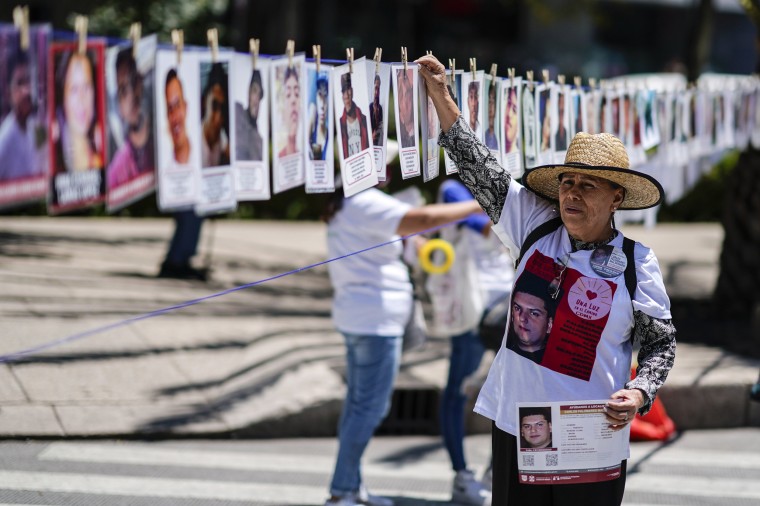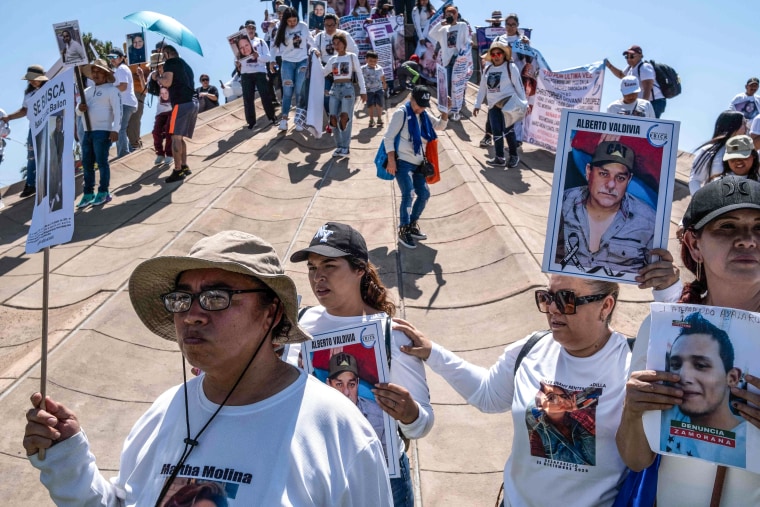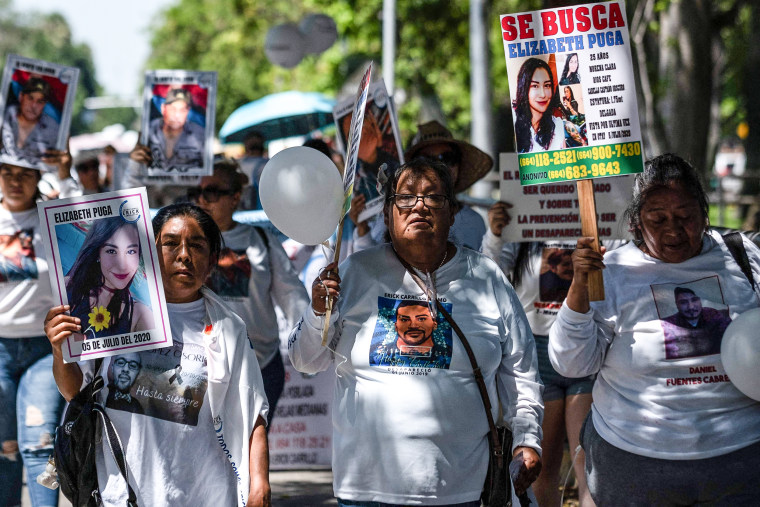Mexican mothers protest lack of government action to find their missing children
“If we don’t search for our children, nobody will do it,” a woman whose sons disappeared a decade ago said at an International Day of the Disappeared march.

Aug. 30, 2023,
MEXICO CITY — Mothers of some of 111,000 people who have disappeared in Mexico over decades of violence on Wednesday marked the International Day of the Disappeared with protests and demands that the government do more to locate their loved ones.
Most of those missing are believed to have been abducted by drug cartels or kidnappers, and their bodies buried in shallow graves or burned.
Some marching down Mexico City’s main boulevard were also protesting an apparent government effort to minimize the problem.
About 200 protesters — almost all women — chanted: “Where are they? Where are our children?”
Edith Pérez Rodríguez, one of the marchers, wore a T-shirt with photos of her two sons, Alexis and José Arturo Domínguez Pérez. They vanished without a trace a decade ago in the northern state of San Luis Potosi.
Lack of funding and manpower have left police and prosecutors unable to conduct even the most basic searches — leaving it to volunteer groups made up of mothers, who often walk through suspected body dumping grounds with shovels, plunging long steel rods into the earth to detect the odor of cadavers.

“If we don’t search for our children, nobody will do it,” said Pérez Rodríguez.
President Andrés Manuel López Obrador has claimed the number of missing has been inflated and that many may have returned home and not bothered to notify authorities. He has launched a massive door-to-door effort by military and unqualified civilian personnel asking residents whether their missing relatives have returned, and checking their names against vaccination rolls.
Activists say that money and effort could be better spent looking for the missing, or at least their remains.
“What are they going to do,” said Pérez Rodríguez, noting that each agent has to handle about 250 missing persons cases, leaving them no time to really investigate.
“That is why we are here,” she said, “to tell the president these numbers are not inflated. This is the reality,” she said, pointing to dozens of other protesting mothers.
Similar marches were held in several other cities in Mexico.

Irma Guerrero has been looking for her son, David, who disappeared in San Luis Potosi on Jan. 13, 2022. Since then, she said she has received “nothing, not from anyone” in the way of help.
Asked about the resignation of Mexico’s top search official, Karla Quintana, last week, Guerrero said she did not care. “None of the officials have helped us.”
“Only the bad guys know, and they don’t help us,” Guerrero said.
Quintana, who did not explain the motives for her resignation, reportedly objected to sending unqualified personnel around to interview victims’ families. Such questioning of already-traumatized families could be damaging, activists say.
Few doubt there may be people listed as missing who have returned home. But many also believe that a similarly large number of missing people in Mexico’s most violent regions may never have been reported by their relatives, either because of fear of reprisals or distrust of authorities.
That distrust is widespread.
Jessica Martinez Cervantes is still looking for her brother Esteban, who also went missing in San Luis Potosi in July 2020.
“Nothing, absolutely nothing,” she said when asked what help she has received from the government.
Rights Experts ‘Outraged’ Over Attacks On Women Activists in Mexico
A group of UN independent human rights experts on Wednesday urged the Government of Mexico to investigate and prosecute those who attack and kill women activists searching for their missing relatives.
“We are outraged that those searching for forcibly disappeared family members and loved ones continue to be targeted and face violence in Mexico,” they said in a statement, issued in the wake of two recent incidents.
Brutal killing
Human rights defender Teresa Magueyal was shot dead while riding her bicycle in Celaya, Guanajuato state, on 2 May. Her son, José Luis Apaseo Magueyal, 34, disappeared three years ago.
Ms. Magueyal was part of a group formed by families of people who have disappeared and was the sixth volunteer to be killed since 2021, according to media reports.
Two months earlier, Araceli Rodríguez Nava, who is in a tireless search for her disappeared son, was attacked in Chilpancingo, capital of Guerrero state. The incident took place on 4 March.
Both women were beneficiaries of the federal protection mechanism for human rights defenders and journalists, the UN experts said. Although their cases remain under investigation, information about its effectiveness has been scarce.
Ensure freedom and safety
The UN experts urged the Mexican authorities to ensure human rights defenders working on enforced disappearances can operate freely and safely.
They said enforced disappearances and attacks targeting these activists are linked to the presence of organised crime groups, extortion, human trafficking, kidnapping networks, corruption and collusion with authorities.
Furthermore, operating in a constant environment of fear, threat and insecurity has an intimidating effect on relatives of the victims, civil society, human rights defenders, and organisations.
Investigate and prosecute
They added that many of the rights defenders are women and older persons, increasing their risk of being targeted.
“It is extremely worrying that impunity for crimes against human rights defenders and activists continues despite complaints being filed. Prevention measures and protection for victims and targets of the attacks are either not provided, or not effective,” they said.
“The Government of Mexico needs to promptly investigate, prosecute, and impose appropriate sanctions on any person responsible for the alleged violations”.
Adopt all measures
As their statement was issued on the International Day of the Victims of Enforced Disappearances, the UN expert surged the Mexican Government “to adopt all necessary measures to prevent irreparable damage to the life and personal integrity of those searching for the forcibly disappeared, their family members, civil society movements, organisations and public servants.”
They noted that a presidential campaign called De Frente a la Libertad is underway in Mexico that is giving greater visibility to the risks faced by journalists and human rights activists in the country.
They said it was time for authorities to take effective measures to protect human rights defenders searching for truth and justice.
About UN rights experts
The statement was issued by Mary Lawlor, UN Special Rapporteur on the situation of human rights defenders; Reem Alsalem, UN Special Rapporteur on violence against women and girls, and Claudia Mahler, Independent Expert on the enjoyment of all human rights by older persons.
It was endorsed by a UN Working Group and Committee whose mandates cover enforced or involuntary disappearances.
The experts were appointed by the UN Human Rights Council and work on a voluntary basis.
They are not UN staff and do not receive payment for their work.
ENDS
No comments:
Post a Comment